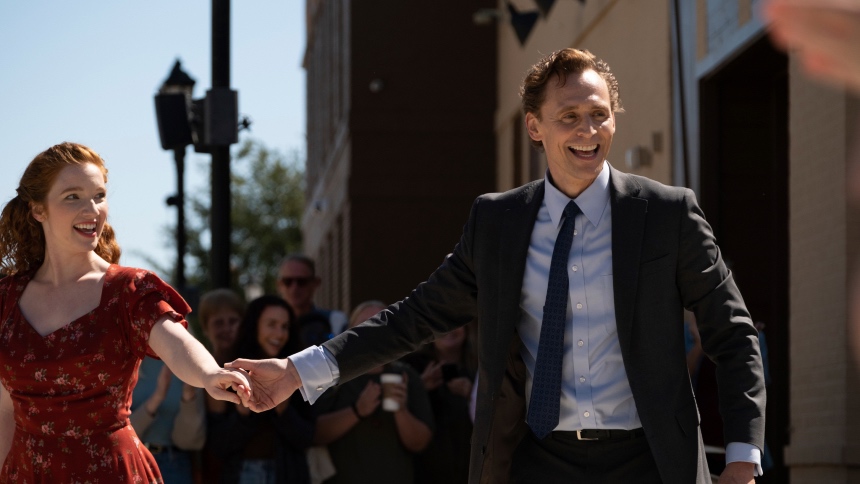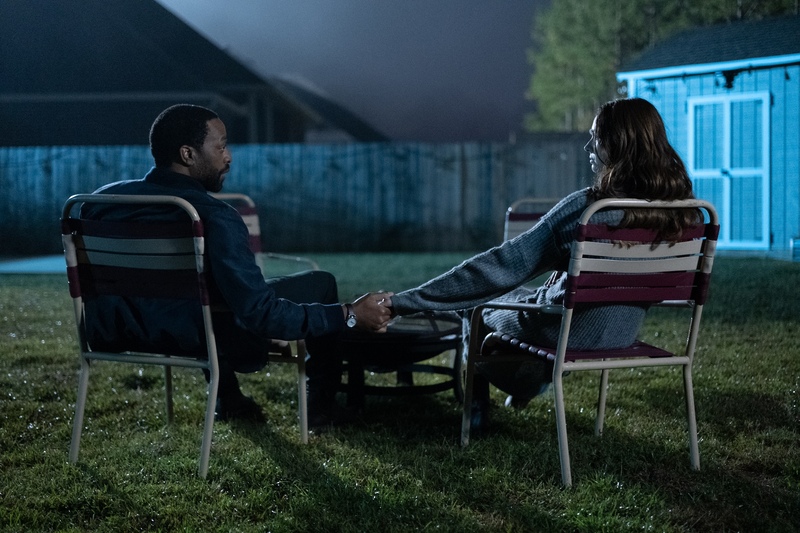THE LIFE OF CHUCK Review: Dance Like Everyone's Watching and Wants to Know How
Mike Flanagan Tackles a somewhat gentler Stephen King story.

In the 'not horror' section of Stephen King's work, are a selection of narratives that often still tease at horror (Stand By Me, The Shawshank Redemption), while at the same aim to present stories that speak to moments that make us/reflect who we are. King's short stories have often been his undersung literary achievements, that nonetheless find their home on the big screen, for the reason mentioned. Filmmakers find his work attractive since they are stories that transfer well to audiovisual medium, with their haunting tales and haunted characters.
The Life of Chuck, a short story from King's collection If It Bleeds, is a natural choice, not just for the screen, but for a filmmaker like Mike Flanagan (Midnight Mass, Oculus). While his past King adaptations, Gerald's Game and Doctor Sleep, were on one end of the terrifying scale, his latest is a far more uplifting, heartfelt story in how it presents its themes on life, love, and death. Clearly designed to tug at the heartstrings, it's a better quality of overt Hollywood-style 'tug at the heartstrings' manipulation, mainly due to its cast.
Told in three parts, it begins at the end: as the world is slipping piece by piece (literally) into the apocalyptic abyss, schoolteacher Marty (Chiwetel Ejiofor) tries to teach his last remaining students, has encounters with neighbours about how they are handling the end of the world, and tries to reconnect with his ex-wife Felicia (Karen Gillan), while seeing thank you messages to some man named Chuck throughout his town. In the second act, we meet Chuck (Tom Hiddleston), a mild-mannered acocuntant on a business trip, who ends up having a beautiful moment of music and dance with a stranger (Annalise Basso). In the first act, we get to know Chuck as a child and teen, raised by his beloved Zadie (Mark Hamill) and Bubbie (Mia Sara).
Beginning at the end (especially THE END of everything) is a strong way to make your audience think about a person's life, what it means in a single moment, as characters themselves wrestle with the same questions. It's refreshing to see an apocalypse story that is not showing violence or anger (at least not dangerous anger), but recognizing how many people would slip into a kind of acceptance and a desperation to live and experience what they truly value. This is part of what sets the film apart from the average 'life is short, tell the people you love that you love them' stories.
Flanagan has a knack for making the uncanny unsettling but believable as part of our everyday world, and arguably it's this tone that makes Act Three the strongest part of the film. We have a general idea of how these conversations will go, but between King's original story, Flanagan's adaptation, and the performances, it feels deeper and richer, more fully realized as a strange speculative vignette that still tugs at our hearts, but our brains more than a little.
Flanagan is known to have a core group of actors that he works with repeatedly. But unlike some directors who have fallen off a cliff of overstuffing their films to use great actors as mere decoration (cough-Wes Anderson-cough), Flanagan knows how to select actors who will be their roles, not their star persona. And even if an actor has only a few lines, they sell the moment and build out the story, such as David Dastmalchian's single father mourning the loss of online porn, or Kate Siegel's middle school teacher character trying to impress the beauty of Walt Whitman on her students. No one in Flanagan's movies is an NPC, and he makes sure to cast actors who give us a whole character even in the briefest of moments.
If Act 3 gives us the macro world as seen through the micro, Act 2 focuses on a small moment; not the most important moment of a person's life, but a memory they would carry with them, as the trajectory of three lives come together as they only could in this one moment. That carefree feeling we all wish we had when we would truly just dance, both like no one is watching and because everyone is. It does, indeed, make you want to dance in the proverbial or literallty aisle. It is quite wonderous in that way we can discover talents in ourselves that, for one reason or another, we were never allowed to explore.
Act 1 moves more to the kind of Hollywood tearjerker we're used to, a little more wholesome though luckily not too much; like Act 3, it's understanding the greater universe through this one person's 'ordinary' life. But within the ordinary, these is love, and tragedy, the joy of music and dancing, and the terror of what we try to hide away in the corners of our homes and minds. There is tragedy that is not glossed over, happiness that is not saccharine, and a thoughfulness to the portrayal of Chuck and how he's able to find a certain joy in his life, but also that weight of responsibility that comes with some very dark, very real ghosts. Again, actors like Hamill and Sara, as well as Flanagan regular Samantha Sloyan as an insightful dance teacher, as well as the actors playing the younger Chuck (Benajmin Pajak and Jacon Tremblay), ground us and make the world feel lived in.
I don't think The Life of Chuck pretends to be saying anything new; and it's perhaps being oversold as an extraordinary work of profound revelation. But it is a very enjoyable time at the movies, with a reminder of why we hold close those ideas and people that we do, taking it a little more into that left field of the uncanny and unexplainable.
The Life of Chuck is currently screening in select cities in the USA, and will open across the USA and Canada on Friday, June 13th.
The Life of Chuck
Director(s)
- Mike Flanagan
Writer(s)
- Mike Flanagan
- Stephen King
Cast
- Tom Hiddleston
- Jacob Tremblay
- Benjamin Pajak








